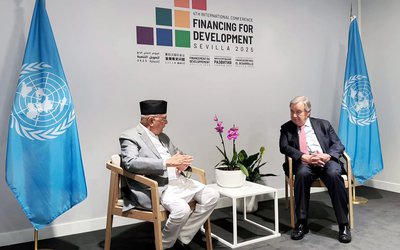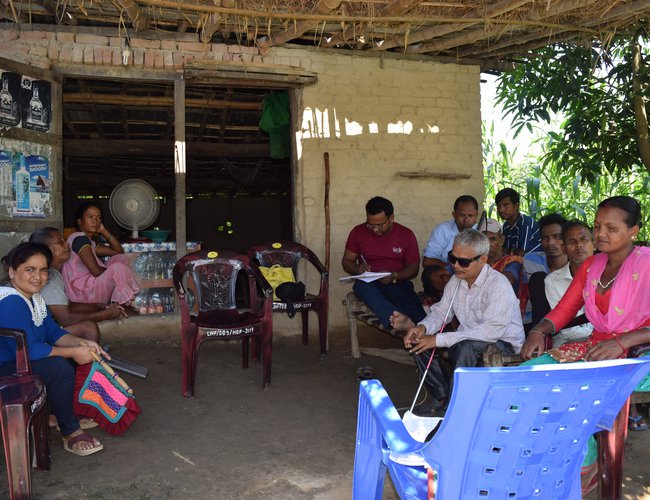
Having lived in discrimination, exploitation and isolation for over one and a half decade, Ram Dayal Chaudhary,25, a former herd-man of Bhajani Municipality, Ward No 1, knows his life has visibly changed from being a disregarded member to a dignified member. Chaudhary, who used to be dependent on his family and community for food, is now earning Rs. 400 (US$ 4) per day selling newspapers to different parts of the city as a hawker.
Infected by Polio at the age of 4, Chaudhary had lost one of his legs and he became lame person with a speech problem. “I was living a very painful life, grazing two dozen cattle for two meals,” narrates Chaudhary, a person using a wheelchair, remembering his past. "I was an outclass, I was not allowed to see a wedding, festival and community ritual."
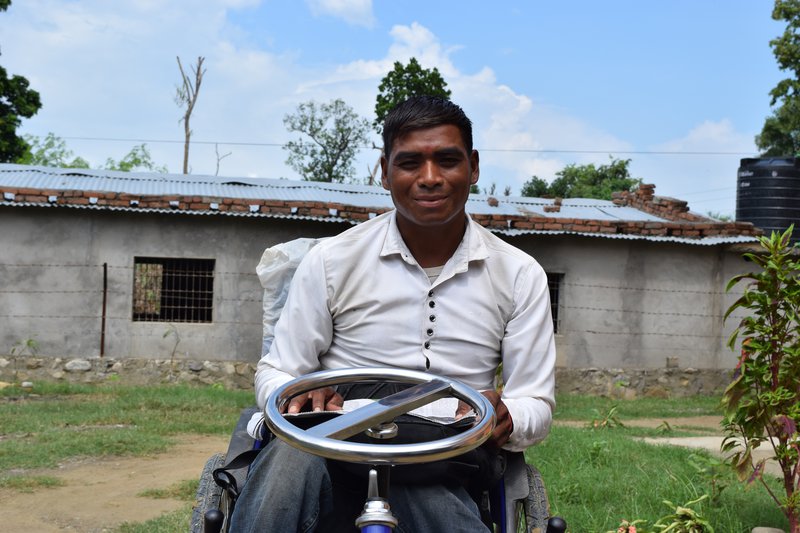
Ram Dayal with his tricycle
"Since I received a tricycle and guidance from Digo Bikas, everything has changed for me. Now I am earning money and people have started to treat me differently asking me to join in all these functions,” said Chaudhary.
Accessibility is a key prerequisite for the rights promotion of persons with disabilities. Studies have shown that accessibility enhances their general mobility, active life, public participation and independent living.
It crosscuts each of the agenda of inclusive development. This is one of the key principles of the United Convention on the Rights of Persons with Disabilities (UNCRPD).
This project includes Disaster RR, sustainable livelihood, community-led good governance and Organizational Effectiveness cooperatives, DPOs and Integrated projects.
Launched with Digo Bikash Samaj (DBS), an implementing partner of LWF Nepal, with support from the Australian Government through the Australian NGO Cooperation Program (ANCP) and Australian Lutheran World Service (ALWS), the Nepal Development Program comes as a boon to many People With Disability (PWDs) of the region.
Like Chaudhary, who went through a prolonged painful life, many others too feel empowered in society. As a visually impaired person, Ram Prakash Chaudhari, 40, a resident of Nawalpur, Ward No 6 of Bhajani Municipality, has shown PwDs that they can do all kinds of work as normal people do.
After receiving support from the project, Chaudhary and his colleagues from Disability People Organization (DPO) have been successfully operating a candle factory at Ward No 6 of Bhajani Municipality.
Operated in three shifts by DPO members, Thapapur Blind and Disability Candle Industry produces candles worth of Rs.100,000 to Rs.150,000 (US$ 1500) annually for sale in the market.
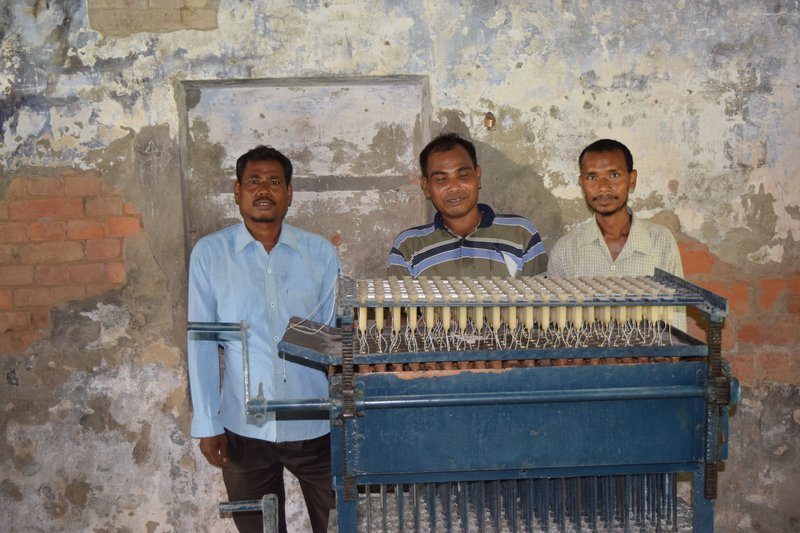
(Candle Factory In Thapapur)
"We exported candle worth of Rs.87,000.00 (US$ 800) to Australia last year," said Chaudhary. "We offered different kinds of job to PwDs depending upon their physical conditions.
Bashant Chaudhary, 22, who is a person with physical disability and unable to speak, deserves to be in category A as per the rule but he received C category ID. Distributed without properly interviewing PwDs and understanding the level of their handicap, many PwDs have applied for a review of their categories.
At a time when there is no work affordable for Chaudhary, the candle factory is helping him to make a certain amount of money monthly. "I have been earning Rs.3000.00. (US$30). “The money is enough to pay electricity bill and some essential commodities in the house," said Chaudhary, who is married to a person with disability, and is a father of a six-month old child.
"I have already applied to change my ID status to A. Hopefully, my life will be more comfortable with government social allowances received under category A," said Chaudhary.
According to the Constitution of Nepal 2072, the responsibility for the management of people living with disabilities is now up on the local government. Therefore, it is the responsibility of the local government to develop and implement programs for the welfare and overall management of the people with disability.
Local levels are issuing four categories of card: Red, Blue, Yellow and White. Red is for complete disability, blue for severe disability, yellow for mild disability and white for general disability.
Those persons with disability having red card receive Rs. 2000 ($20) every month and those with blue receive Rs. 600 ($6) as social security allowance. But among the blue-card-holders, 60% are either not provided with the allowance or have not taken it because they feel ashamed of receiving the grant as it is very minimal; even not sufficient for medicines.
After the pressure from PwDs, organized through DPOs, the local level elected bodies, which are given responsibility to issue ID and distribute allowances, agree to take another survey and correct the past mistake.
“We have seen many flaws on the previous census and categorizations. With the support and help from partner NGOs and DPOs, Municipality will distribute the new cards correcting the past mistakes,” said Sher Bahadur Chaudhary, mayor of Bhajanai Municipality. “Our board has already passed the local act to correct the card and redistribute it as the state of PwDs.”
Paralyzed by spinal cord injury in early year, Kalap Singh Badayak, 32, the chairperson of Shrijansheel Disabled People Organization of Joshipur Rural Municipality, Ward 6, can move only with support from his wife. Despite this physical difficulty, he has been organizing meetings, raising the issue of disability and supporting PwDs to register in the local municipality.
"The last three years was a very memorable period for us to establish rights of PwDs as equal members in society and acquire the benefits from local levels. Forming DPOs, we are more organized and able to raise our concern collectively. This is possible because of technical and financial support from Digo Bikas, ALWS and LWF-Nepal,” said Badayak.
Fulpati Chaudhary, 30, member of Smriti Mahila Krishak Samuha of Janaki Rural Municipality, Ward 4, Belpur and a spouse of PwD, is grateful with the project which has helped change the social perception of PwDs, increasing their access to local level and making PwDs self-reliant.
"With the help of tri-cycle, my husband is running a grocery shop on his own and has already applied to upgrade the ID card," said Chaudhary, mother of two children. "Mobility is the most important part of life. Since my husband was able to move through a tri-cycle, he has been independent."
Gore Tharu, 50, and his wife Ful Kumar Chaudhary, 35, a resident of Janaki Rural Municipality, Ward 7, are both Visually Impaired Persons . With support from the project, they are running poultry and vegetable farm.
"With the seed money provided by Digo Bikash, we started poultry two years ago. We earned a net income of Rs.80,000 (US$ 700) last year," said Tharu. “As chickens are ready to sell and vegetables are better this year, our income may cross Rs.100,000 (US$ 900) this year.”
Having a 3-year old son, both the husband and wife, who live in an extended family, work in the field. "We cannot clean the poultry but both of us work in the vegetable farm with other family members," said Gore Tharu. "We can work under guidance from Mobile app."
Many other PwDs like Chaudhary and Tharu feel a new environment and status in the community, thanks to the tri-cycle and livelihood support helping PwDs to be independent and self reliant.
From Isolation To Inclusion
PwDs suffered several kinds of discrimination in the past. Regarding disability as a curse of previous life, people in Bhajani Municipality, Joshipur Rural Municipality and Janaki Rural Municipality avoided meeting PwDs during the social and religious functions. Touching PwDs and speaking with them were regarded as a bad luck.
Some parents in these areas still hold the view that it is better to keep PwDs separately in the house rather than to expose them publicly. Despite knowing that their offspring have disability, they still keep them inside home.
Launched in 2017, the program has not only provided support for mobility and livelihood, it has also helped PwDs to receive Disabled Identity Card and allowances and other benefits.
With the formation of Disabled People Organization (DPOs) at their own locality, PwDs have an organized platform to discuss the issue related to disability and their concerns regularly.
The total number of PwDs in Kailali is 15375 and the number in two rural municipalities and one municipality is over 2500, with the nature of handicap varying across people, Physical, Blindness, Low Vision, Deaf, Hard of Hearing, Deaf, Blind, Speech Problem, Mental Disability, Intellectual and Multiple Handicaps. However, only 288 received the ID cards before implementation of the program in 2017.
The program has reached to 1,738 people with disability and facilitated 1,472 PWDs for Disability ID card and Citizenship certificate. Similarly 100 PWDs are mainstreamed for income generating activities through SIYB training, and 661 related stakeholders from School, Government offices and NGOs are sensitized on PWD mainstreaming.
The program has reached the priority population from various age-groups in community and in schools. Similarly, 86 girl pupils with PwD and 117 boy students with PwD were directly benefited from project intervention.
Although the project is focused in mainstreaming PWDs, it has encouraged participation of related stakeholders during project implementation.
Disability right promoter from Kaliali Nanda Raj Bhatta, who himself, is a PwD said that there are still many hidden cases and the data is inaccurate. "There are more PwDs than the National Census Report shows. This is the reason we are demanding our participation in the coming census," said Bhatta.
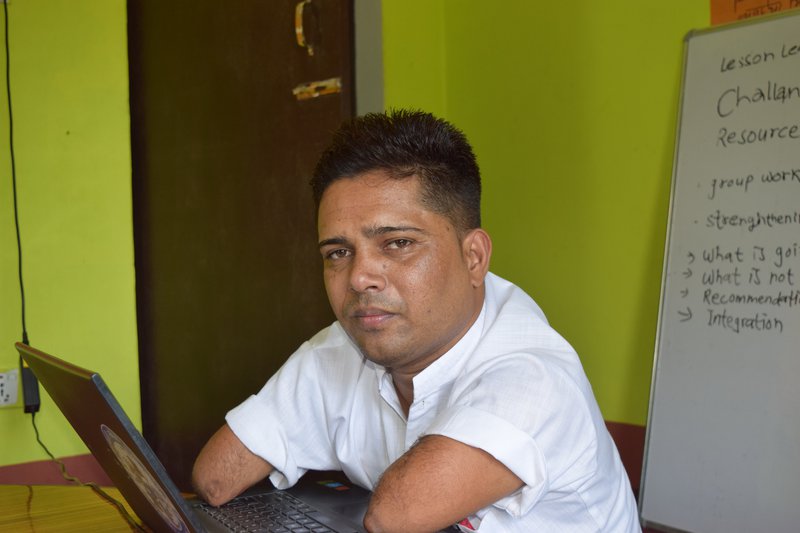
(Nanda Raj Bhatta)
Project’s Achievement
The project has not only supported PwDs for livelihood but also helped to organize and form Disabled People Organizations at local level. Along with raising awareness on rights of disabled, the project also showed the way to get the government’s social allowances given to the disabled people.
"Despite certain shortcomings, the program has drastically changed the state of PwDs in the areas. The awareness level has gone up in the community regarding PwD. Many PwDs have started livelihood options, organized through DPO, increased mobility and access to resources and recognition in society," said Ram Bahadur Sunar, chairperson of Digo Bikas Samaj. "What is now required is to mainstream left-out PwDs and offer them livelihood options and equipments for mobility."
The project also encouraged the local cooperatives and groups to incorporate the people with disabilities in their program. The schools were given technical support to start the disabled friendly education.
“With the support from the project, we are now running primary classes for Deaf students of the community,” said Rajesh Kumar Chaudhary, headmaster of Jan Prakash Secondary School of Joshipur Rural Municipality. “We have 14 deaf students and are providing tuition-fee-free education to the deaf students up to class 5.”
The attitudes of people toward PwDs in community, government and elected bodies have changed. All different stakeholders are engaging them in various activities. Local cooperatives are providing loans in concessional rate and they also amended the rules, making the presence of PwD in the board mandatory.
Like many other cooperatives, Diya Aur batti Saving and Credit Cooperative has amended its procedures making elections of PwD as a board member mandatory. Out of 416 women shareholders, 31 are PwDs. “We are providing loan in concessional interest rate to PwDs. Instead of charging 16 percent, we are charging 11 percent interest rate with PwDs,” said Ananti Dagaura Chaudhari, chairperson of the cooperative. “Under the concessional schemes, 10 PwDs are taking loan for grocery, tailoring and other business.”
Local levels invite DPO members regularly for interactions and they are invited to attend all official and social functions as guest. Rural Municipalities and Municipalities are allocating additional budget for PwDs and their welfare.
“Our rural municipality has taken several decisions to mainstream the PwDs. We have increased the annual budget almost 100 times to PwD. The municipality has also passed an act to make a mandatory presence of PwD in all national functions. Similarly, our building guidelines have also a provision to include Ramp in the new construction. We are reevaluating census of PwD,” said Geeta Katharia, vice chairperson of Joshipur Rural Municipality. “I am really thankful to disability project which helps make PwD an agenda.”
Challenges for PwDs
Along with the success, there are also challenges. There is the need to have a program to include the people who are yet to secure all these benefits because they are out of formal organizations like DPOs. Some are intentionally avoiding public disclosure of disability and some others are still unknown about the program and are living in the pain.
One of the parents of Moti Secondary school of Janaki Rural Municipality, Ward 7, Motinagar, intentionally avoided to make her daughter’s identity public. “We are encouraging the parent to disclose daughter’s identity but the parent declined to do so,” said Durga Prasad Lamsal, headmaster of the school. The school offered free education to the person with disability. “We know the girl has physical disability but we cannot force her to declare it.”
Some others are still out of contact because of unawareness. Kalasi Chaudhari, 55, mother of 35-year-old deaf, with physical disabilities, is still facing all kinds of hardship due to her daughter.
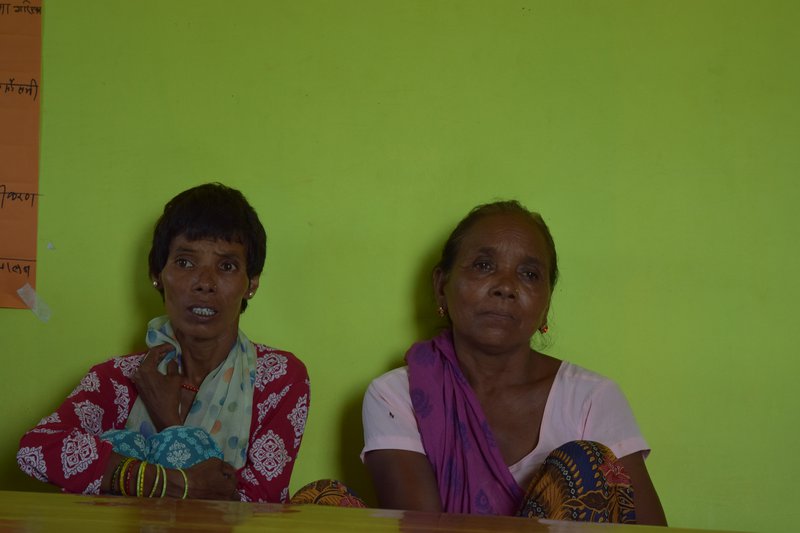
(Kalasa Chaudhary with her daughter (left)
“Although my daughter is physical disabled, and unable to speak, she is given B grade card with no one coming to us with any support,” said Kalasi, full of tears. “I can take her till I live, I don’t know what happens to her if I die earlier,” the widow, having not a piece of land to grow food, added.
Along with Gita, there are a number of others who need to identify and provide support. As the small support given by the project has transformed the life of people, there is the need to replicate this to other places as well.
“With an aim to mainstream PwDs in Community, to link and support employment opportunity to persons with disabilities at public and private sectors, to capacitate to the VDC level DPO networks for advocacy on access to services and resources, the program has already brought the change. LWF-Nepal and ALWS are making efforts to mainstream the left-out PwDs,” said Bal Krishna Chaudhary, Provincial Program Coordinator, Sudurpaschim and Karnali Province.
Although programs come and go, what National Development Program has taught PwDs like Ram Dayal Chaudhary is for them to learn to live independently with dignity and respect.
Reporting from Bhajani and Tikapur

Keshab Poudel
Poudel is the editor of New Spotlight Magazine.
- ETFC Nepal is focused on expanding distribution and transmission to the private sector: ETFC Chair Dr. Dhital
- Jul 05, 2025
- FOURTH PROFESSOR Y.N. KHANAL LECTURE: Nepal-China Relations
- Jun 23, 2025
- Colonel JP CROSS: Centenary Birthday
- Jun 23, 2025
- REEEP-GREEN: Empowering Communities with MEP
- Jun 16, 2025
- BEEN: Retrofitted For Green
- May 28, 2025





